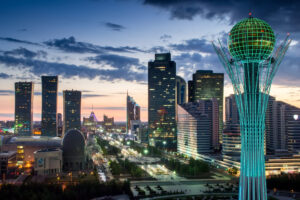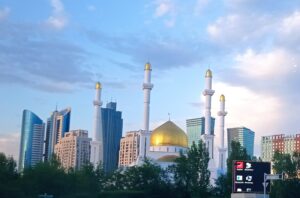ASTANA: The Daily Astana Times has selected articles on Kazakhstan published in international media. This week’s foreign media digest covers the European Union’s investments in the Middle Corridor, Central Asia’s rare earth elements, Kazakh movies, and more.
EU identifies TITR-framed investments
The European Union (EU) has identified 33 areas for investing in the physical infrastructure of segments of the Trans-Caspian International Transport Route (TITR, or Middle Corridor), Trend reported citing the EU Commissioner for Transport Adina Valean.
“The modern TITR is a cornerstone of the EU’s efforts to promote regional economic integration and improve connections with Europe. We have identified 33 investment needs for the TITR infrastructure, ranging from the modernization of railways to increasing the capacity of ports on the Caspian Sea and upgrading the fleet,” said Valean.
To note, the EU is ready to allocate 10 billion euros ($10.9 billion) for the development of the TITR.
Kazakhstan, Kyrgyz Republic express mutual interest in maintaining political, economic contacts
Anadolu Agency released an article on Jan. 29, on a meeting between Kazakh and Kyrgyz Foreign Ministers Murat Nurtleu and Jeenbek Kulubaev.
According to the ministry, the talks focused on trade and economic cooperation between the two countries, including the construction of an industrial trade and logistics complex, the elimination of barriers to mutual trade, and ensuring the free movement of goods and maintaining a “stable situation” on the Kyrgyz-Kazakh border.
Sorin Grindeanu meets with his counterpart from Kazakhstan
Kazakh Minister of Transport Marat Karabayev and Romanian Transport and Infrastructure Minister Sorin Grindeanu discussed prospects for expanding cooperation during their meeting in Bucharest, reported News.ro on Jan. 31.
Karabayev and Grindeanu addressed collaboration in cargo transportation within Romania-Black Sea-Caucasus-Caspian Sea-Kazakhstan, through which the TITR passes.
Central Asia seen as key to breaking China’s rare earth monopoly
The Voice of America (VOA) published an article on Jan. 25 on a report released in the United States, which stated that Kazakhstan, the region’s economic giant, holds the world’s largest chromium reserves and the second-largest stocks of uranium, while also possessing other critical elements.
Report co-author Ariel Cohen says it is up to the governments of Central Asia to create the investment climate for development of these resources.
“They may be the next big thing in Central Asia as the engine of economic growth,” Cohen said during a panel discussion at the Atlantic Council, a Washington think tank.
Experts note that rare-rather elements (REEs) are found in substantial volumes in the Kazakh steppe and uplands as well as in the Tien Shan mountains across Kazakhstan, the Kyrgyz Republic and Uzbekistan, and in the Pamir Mountains in Tajikistan.
Monazite, zircon, apatite, xenotime, pyrochlore, allanite, and columbite are among Central Asia’s most abundant rare metals and minerals.
In 2016, the U.S. Geological Survey listed 384 REE occurrences in the region: 160 in Kazakhstan, 87 in Uzbekistan, 75 in the Kyrgyz Republic, 60 in Tajikistan, and two in Turkmenistan.
Kazakhstan ranks eighth globally in online service index – Kazakh minister
Kazakhstan ranks eighth in the world in providing online services, Trend reported on Feb. 1, citing Bagdat Mussin, Kazakh Minister of Digital Development, Innovation and Aerospace Industry, at the opening of the Digital Almaty 2024 forum.
“Holding high-level events of international scale within the framework of Digital Almaty demonstrates the advanced development of digitalization in our country. In fact, according to the United Nations (UN) rating, Kazakhstan today ranks eighth in the world in the provision of online services,” he said.
According to him, Kazakhstan is in the 28th place in the world on the development of e-government.
Kazakhstan strategizes to reach carbon neutrality by 2060
Kazakhstan is developing a roadmap for the implementation of the Strategy for Achieving Carbon Neutrality of Kazakhstan until 2060, reported Trend on Jan. 31.
In connection with the development of the roadmap, a meeting was held with the participation of the Minister of National Economy Alibek Kuantyrov and other high-ranking industry officials.
During the meeting, Kuantyrov noted that the roadmap should be the main tool for the energy transition and achieving net-zero greenhouse gas emissions by 2060. In this regard, a working group has been created. More than 200 experts are taking part in its work.
According to the minister, decarbonization will affect almost all sectors of the economy, especially energy, industry, agriculture, and waste management. The minister noted that when developing the roadmap, it will be necessary to create a unique model of energy transition for Kazakhstan.
Kazakhstan, EU collaborate to streamline visa process for Kazakh citizens
Caspian News published an article on Jan. 30 about talks between Kazakhstan and the European Union on visa facilitation for Kazakh citizens.
On Saturday, Kazakh Deputy Foreign Minister Alibek Bakayev and the Ambassador of the European Union to Kazakhstan, Kestutis Jankauskas, met to discuss the second round of formal consultations aimed at simplifying the visa application process.
According to the press service of the Kazakh Foreign Ministry, the primary goal of these discussions is to streamline the European visa regime. This involves reducing consular fees, extending visa validity periods, decreasing the time required for processing applications, and establishing a unified list of required documents for obtaining a visa.
Call for grant proposals of the Small Grants Program of the Global Environment Facility
Small Grants Program of the Global Environment Facility (GEF SGP) in Kazakhstan, operating under the auspices of the United Nations Development Programme (UNDP), released a statement on Jan. 29 announcing the commencement of the call for grant proposals as part of the implementation of the Seventh Operational Phase.
Grant proposals are accepted exclusively from registered non-profit, non-governmental public organizations (NGOs) in Kazakhstan. Proposals from government agencies, enterprises, commercial structures (LLPs, etc.), and research organizations will not be considered.
Project proposals should be oriented towards the implementation of activities in one of the two designated thematic areas: mitigation of the impacts of climate change, and reduction of processes leading to land degradation.
Kazakhstan offers port, airport management to EU investors
Kazakhstan has offered its Caspian Sea ports of Aktau and Kuryk, as well as 22 airports, to European investors for management in an effort to build a strong transit hub between Asia and Europe, reported Euractiv on Jan. 29.
The announcement was made by Kazakh Transport Minister Marat Karabayev while speaking in Brussels at the opening of a two-day forum dedicated to EU-Central Asia transport connectivity.
“We are ready to hand over the remaining 22 airports of Kazakhstan to European investors for management, which will really become a transit hub between Asia and Europe”, Karabayev said.
In addition, the minister announced a similar partnership concerning the country’s seaports on the Caspian, Aktau and Kuryk.
The forum gathered many officials and, significantly, a large number of representatives of the business community.
Movie “Kazakh Khanate: Diamond Sword” screened at Pakistan National Council of Arts
In an effort to strengthen cultural relations, the Pakistan National Council of the Arts (PNCA) and the Embassy of Kazakhstan organized a screening of the movie “Kazakh Khanate: Diamond Sword” in Islamabad, reported Asia News Network on Feb. 1.
Federal Minister for National Heritage and Culture, Jamal Shah, commented that the film was highly educational, highlighting themes of honor, solidarity, and dignity as key values.
The minister also noted that the movie screening reflects the growing cultural and collaborative ties between Pakistan and Kazakhstan. He emphasized the paramount importance of cultural exchanges, acknowledging the rich cultural heritage and picturesque landscapes of the region.
Royal Conservatoire of Scotland composer to premiere Robert the Bruce opera in 750th anniversary year
A new opera commemorating the 750th anniversary of the birth of Robert the Bruce will premier in four landmark Scottish churches this year. The work, penned by Rakhat-Bi Tolegenuly Abdyssagin, a doctoral researcher from Kazakhstan at the Royal Conservatoire of Scotland, was announced by the conservatoire’s press service on Jan. 23.
The PhD composer and pianist Abdyssagin will stage his one-hour opera, “The Bruce,” at Glasgow Cathedral on Feb. 17, St. Giles’ Cathedral Edinburgh on Feb. 21, the University of St. Andrews, St. Salvator’s Chapel on Feb. 24, and Dunfermline Abbey on March 3.








